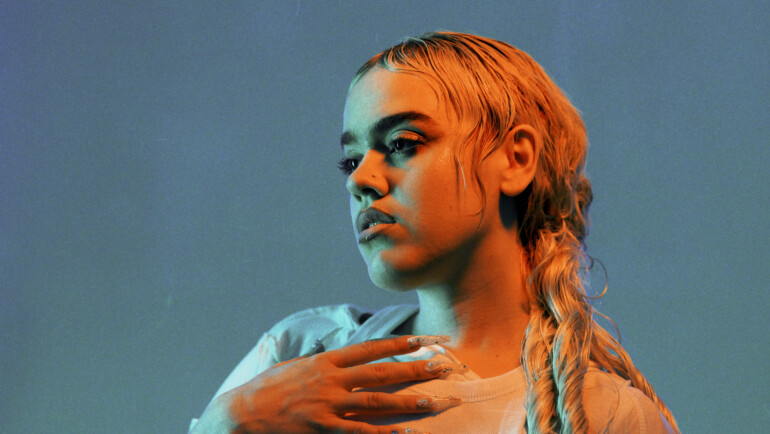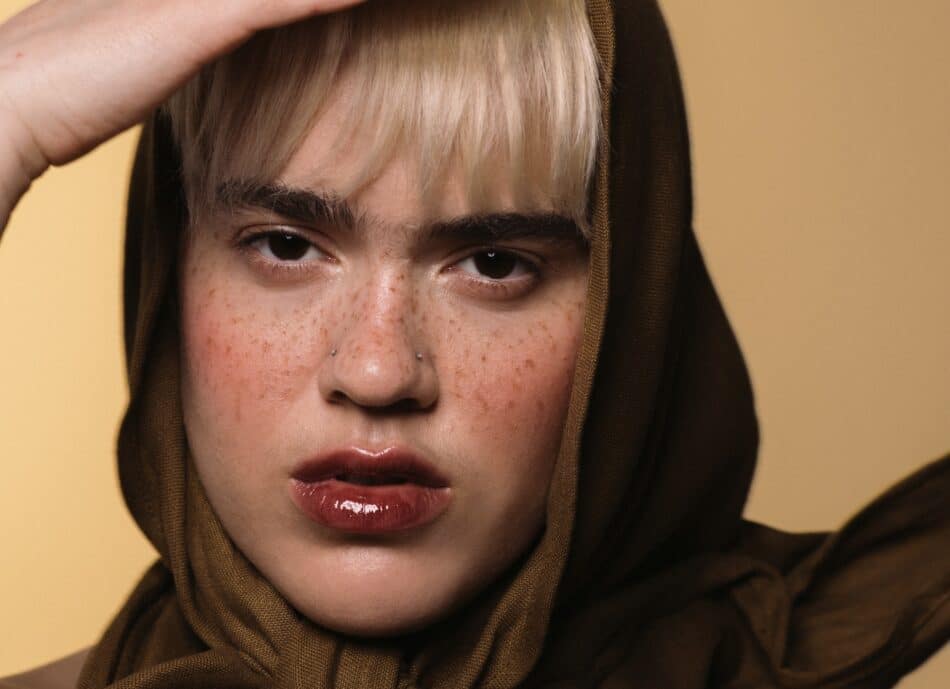
She’s a former jazz singer and currently one of Austria’s top up-and-coming rappers: Kiara Hollatko, aka KeKe, was discovered by Universal’s MOM I MADE IT label in 2018 and has been mixing up the local music scene ever since. In August, her new single “Thick” was released, which was born out of a very personal story and also comes from completely different musical corners. Her way into the rap bubble was relatively accidental – but genres don’t matter to her anyway, as she tells Katharina Reiffenstuhl in an interview.
You played in a band for years. How did your solo project come about then?
KeKe: I made a cover of a song by London Grammar and put it up on YouTube. I wanted to make my ex jealous with it and show him that I’m way more talented and better than him. I don’t think he ever saw it [laughs]. But a label did see it. And they asked me if I wanted to sing with them. I never planned to be a musician. At least I never pushed it. I’ve always done music, but at the time this happened, I honestly had no idea what to do with my life.
“I wanted to make my ex jealous with it […] But I don’t think he ever saw it.”
So when did you reach the point where you knew you were really going to be a musician?
KeKe: Basically when I signed there.
So that’s plan A and there’s no plan B?
KeKe: Hmm, I think I would have been a “plan B person” if I had known what plan B was. I was really completely clueless. So, I don’t just go through life now without anything being important to me, and think to myself that everything will simply fall in my lap. I also wanted to do my job well. So I just thought to myself, “Okay, if it turns out that way now, then that’s probably what I’ll do.” But I never had a calling or anything for music.

Your music is actually a very different direction than what you studied, too: jazz.
KeKe: Yeah, that’s right. I totally like to dabble in different styles. I’ll do anything that feels or sounds good. I don’t think in genre;, I don’t care about that. I tried it the way I did and it just worked – it could have been that it didn’t work out. I mean, if I would try to sing in a metal band now, that probably won’t turn out well. [laughs] Rap just worked, so I just did it.
“I’M MUCH MORE OF A BOSS NOW IN WHAT I DO”.
Your first single came out in the summer of 2018, which is now four years ago. What has changed for you since then, how have you developed as a person?
KeKe: Everything has changed. I’m certainly not the same person I was four years ago – one hundred percent not. I would say I’ve gotten to know the music industry better. I’m better at maneuvering through this business. I’m much more of a boss now in what I do. I hardly let anyone tell me anything, I’m much stronger and more self-confident and I also totally believe in what I’m doing. And that wasn’t the case before.
I actually just noticed – you have the name of your first single tattooed on your arm. Just as a reminder of the first song?
KeKe: Exactly. There was this tattoo booth in Berlin and I just went in and wanted to get it immortalized. I would have liked to have it in a different font at this point. [laughs] But well, it doesn’t matter.
With your new single “Thick” one thinks, at the first moment,that you’ve put out your first English song. In the end, a large portion is still German. Can you imagine to release music completely in English or are you too committed to Deutschrap?
KeKe: No no, I will actually release something in English this winter. I do both now – and pretty much equally. Actually, I’ve been singing in English all my life. I didn’t do it in German before KeKe. That’s why it’s a bit back to the roots for me now.
Why did you start writing German lyrics music in the first place?
KeKe: Because back then I got connected with STSK (note: Shawn The Savage Kid), a producer and rapper who is now one of my best friends. He raps in German – and he’s such a rad songwriter and artist that it worked out really well together with him. I think German is a very difficult language, it’s quite an art to write in German. And STSK can do that. Writing with him just made sense. It was an absolutely emotional decision. I certainly could have just done English music.
What’s very noticeable about “Thick” is the completely different beat compared to your other tracks.
KeKe: Yes. It’s co-produced with Johannes Madl and co-written with STSK. It’s fully inspired by Ball Culture, which is also a really rad community that I fully admire. I’m so grateful that they brought this kind of music and this energy. That feels right to me and I think I just make a lot of music now, which I also listen to myself. So maybe that’s why it’s a little different than it used to be.
You have collabs with rappers like Trettmann or Felix Kummer. How did you get in touch with them?
KeKe: Felix discovered me on Instagram, I had a good 600 to 1000 followers. He then wrote to me and asked if I wanted to be on his album. With Trettmann it happened that in Diffus magazine there was some article about me, which Kitschkrieg saw. They then played Trettmann stuff from me and then said “Hey, I like that, I want to take that on the album”.
How was that for you at that time? When you mention this number of followers, you were probably still relatively at the beginning…
KeKe: I wish I could find the voicemails where Felix wrote to me. I was screaming. [laughs] I’m a huge Kraftklub fan. When he wrote to me, I just cried and screamed into the phone at the same time.
“I DO A LOT OF THINGS WITHOUT THINKING”.
Your music videos are usually very colorful and lively. In the video for “Paradox” everything is black and white. Did you consciously want to do it that way?
KeKe: Yes. I think I can remember wanting it that way. But it wasn’t a decision with great intention. I think I just thought it looked better. There’s something like that coming up again – I’m doing another black & white video soon. I do a lot of things without thinking.
Do you also write your songs without thinking?
KeKe: Well, the German stuff I always write together with STSK. It’s always a very conscious decision. I have themes, I get into sessions and I just know, “I have to get rid of that, we have to make that into a song”. It’s actually always very conscious and with a lot of intention.
You do deal a lot with topics like feminism, mental health and self-love, which is very much reflected in your music. In many articles you are, therefore, called the “voice of the generation”. Can you identify with that?
KeKe: Absolutely not. I am ONE voice of ONE generation. With me, it’s just “I don’t mind sharing.” But these are all things that friends around me experience and feel the same way. I just found a tool to express that. But I don’t want to be that either, that’s terrible. I am so far from being a perfect person, I make mistakes all the time, I stumble just the same, I contradict myself a lot. I don’t have a clue about life either, I drag myself through it just like everyone else.
Very reflective.
KeKe: That’s what therapy and mental illness does to you. [laughs]
It’s kind of out of left field, but you were actually a contestant at the Kiddy Contest (Wikipedia) in 2007. Would you say that had an influence on your path to becoming a musician?
KeKe: No. Not at all. The only thing I noticed there is that I like being in front of cameras and I feel very comfortable in that environment. And there were a few people there that I still follow a little bit. The experience was really nice, but when it was over, I honestly never thought about it again.
“I WANTED TO MAKE A SONG THAT I WOULD HAVE LIKED TO HEAR WHEN I WAS 14 and being bullied at schooL […]”
Will you actually have an album at some point?
KeKe: Just yesterday I was thinking that I would like to make an album. But it’s not planned. The thing is, I have two EPs coming out, and they would have a total volume of an album. But just because the style is so varied there, I don’t want to scare anyone. But maybe I should really make an album.
“A song that explicitly celebrates people who are often not seen or celebrated […]”
And for the release of your latest single, is there a plan?
KeKe: I’m going to bust out the single and see what happens. Then I’m going to have a beer. I’m so excited for the song. It’s my favorite video so far, and it’s one of my favorite songs I’ve ever done. It’s totally important to me. I wanted to make a song that I would have loved to have heard when I was 14 and being bullied at school because of my weight and how I looked. I never saw anyone on TV back then that represented me and my body type. Hearing that song in my youth would have been so great, so I really wanted to do something like that – a song that explicitly celebrates people who are often not seen or celebrated in that way, and also discriminated against a lot in everyday life because of the fact that they have more weight. So the song is fun and playful, but it also has a very personal background.
Thank you for the nice conversation!
Katharina Reiffenstuhl
Translated from the German original by Arianna Alfreds.
